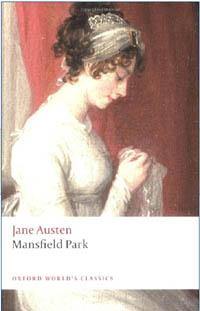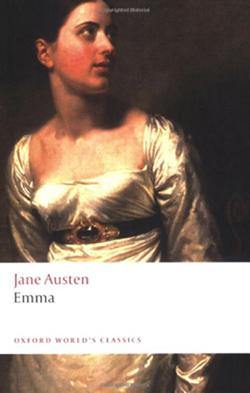Emma: An Overview
Emma, by Jane Austen, first published in December 1815, is a comic novel about the perils of misconstrued romance. The author explores the concerns and difficulties of genteel women living in Georgian-Regency England; she also creates a lively 'comedy of manners' among her characters. Before she began the novel, Austen wrote, "I am going to take a heroine whom no-one but myself will much like." In the very first sentence she introduces the title character as "Emma Woodhouse, handsome, clever, and rich." Emma, however, is also rather spoiled; she greatly overestimates her own matchmaking abilities; and she is blind to the dangers of meddling in other people's lives.
Emma Woodhouse is a young, beautiful, witty, and privileged woman in Regency England. She lives on an estate in Surrey in the village of Highbury with her father, a hypochondriac who is excessively concerned for the health and safety of his loved ones. Emma's friend and only critic is the gentlemanly George Knightley, her neighbour from the adjacent estate of Donwell, and brother of her elder sister Isabella's husband. As the novel opens, Emma has just attended the wedding of Miss Taylor, her best friend and former governess. Having introduced Miss Taylor to her future husband, Mr Weston, Emma takes credit for their marriage, and decides that she rather likes matchmaking.
Against Mr. Knightley's advice, Emma forges ahead with her new interest, and tries to match her new friend Harriet Smith, a sweet but none-too-bright girl of seventeen–described as "the natural daughter of somebody"–to Mr. Elton, the local vicar. However, first she must persuade Miss Smith to refuse an advantageous marriage proposal from a respectable young farmer, Mr. Martin, whom Emma decides is not good enough for Harriet. Against her own wishes, the easily-influenced Harriet turns Mr. Martin down. However, soon Emma's schemes go awry when Mr. Elton, a social climber, proposes to Emma and scoffs at the idea of marrying the socially inferior Harriet.
After Emma rejects Mr. Elton, he leaves for a while for a sojourn in Bath, and Harriet fancies herself heartbroken. Emma now tries to convince Harriet that Mr. Elton is beneath her after all. An interesting development is the arrival in the neighbourhood of Frank Churchill, Mrs Weston's stepson, whom Emma has never met, but in whom she has a long-standing interest. Also, Mr. Elton, who will reveal himself to be more and more arrogant and pompous as the story continues—much like Mr. Collins in Pride and Prejudice—returns with another newcomer, a common, vulgar but rich wife who becomes part of Emma's social circle, though the two women soon loathe each other.
A third new character is the orphaned Jane Fairfax, the reserved but beautiful niece of Emma's impoverished neighbour, the talkative Miss Bates. Miss Bates is an aging spinster, who is well-meaning but increasingly poor; Emma strives to be polite and kind to her, but is irritated by her dull and incessant chattering. Jane, who is very accomplished musically, is Miss Bates' pride and joy; Emma envies her talent and initially dislikes her for her apparent coldness and reserve. Jane had lived with Miss Bates until she was nine, but Colonel Campbell, a friend indebted to her father for seeing him through a life-threatening illness, welcomed her into his own home where she became fast friends with his unfortunately plain daughter and received a first-rate education. On the marriage of Miss Campbell, Jane returned to her relations, ostensibly to regain her health and prepare to earn her living as a governess. In her eagerness to find some sort of fault with Jane—and also to find something to amuse her in her pleasant but dull village—Emma indulges in the fantasy, apparently shared by Frank, that Jane was an object of admiration for Miss Campbell's husband, Mr. Dixon, and that it is for this reason she has returned home, rather than going to Ireland to visit them. This suspicion is further fueled by the arrival of a piano for Jane from a mysterious anonymous benefactor. Emma tries to make herself fall in love with Frank largely because everyone says they make a handsome couple.
Frank seems to everyone to have Emma as his object, and the two flirt together in public, including on a day-trip to Box Hill, a local beauty spot. Emma ultimately decides, however, that he would suit Harriet better after an episode where Frank 'saves' Harriet from a band of Gypsies. At this time, Mrs. Weston wonders if Emma's old friend Mr. Knightley might have taken a fancy to Jane. Emma promptly decides that she does not want Mr. Knightley to marry anyone, but rather than further explore these feelings, she claims that this is because she wants her nephew Henry to inherit the family property.
When Mr. Knightley scolds her for a thoughtless insult to Miss Bates, Emma is privately ashamed, and tries to atone by going to visit Miss Bates. Mr. Knightley is surprised but deeply impressed by Emma's recognition of her wrongdoing and attempt to atone, revealing a foreshadowing of more meaningful affection for Emma. Meanwhile, Jane reportedly becomes ill, but refuses to see Emma or accept her gifts. Emma believes that Jane's behaviour stems from Emma's previous neglect of Jane and/or coldness towards Jane. Jane also suddenly accepts an offer for a governess position from a friend of Mrs. Elton's. Emma soon thereafter learns the reasons for Jane's odd behaviour: Jane and Frank have been secretly engaged for almost a year. Frank had pretended to admire Emma in order to disguise his clandestine relationship with Jane. Jane's distress was due to the fact that she and Frank had quarrelled over his behaviour towards Emma and his unguarded behaviour towards Jane, which Jane believed could put them at risk for discovery. The death of Frank's overbearing aunt/adoptive mother frees Frank to marry Jane, and the engagement becomes public. When Harriet confides that she thinks Mr. Knightley is in love with her, jealousy forces Emma to realize that she loves him herself. Mr. Knightley has been in love with Emma all along, and after the engagement of Jane and Frank is revealed, he proposes to her. Shortly thereafter Harriet reconciles with her young farmer, Mr. Martin; Jane and Emma reconcile; and everyone lives happily ever after.
Conclusions
Emma Woodhouse is the first Austen heroine with no financial concerns, which, she declares to the naïve Miss Smith, is the reason that she has no inducement to marry. This is a great departure from Austen's other novels, in which the quest for marriage and financial security are two of several themes in the stories. Emma's ample financial resources are one of the factors that make this novel much lighter than Austen's earlier works, such as Sense and Sensibility and Pride and Prejudice. Jane Fairfax's prospects, in contrast, are bleak. Emma also proves surprisingly immune to romantic attraction and sexual desire. In contrast to Austen heroine Marianne Dashwood, who is attracted to the wrong man before she settles on the right one, Emma shows no romantic interest in the men she meets. She is genuinely surprised and somewhat disgusted when Mr. Elton declares his love for her much like the way Elizabeth Bennet reacts upon Mr. Collins' proposal. Her fancy for Frank Churchill represents more of a longing for a little drama in her life than a longing for romantic love. Notably, too, Emma utterly fails to understand Harriet Smith and Robert Martin's budding affection for each other; she interprets the prospective match solely in terms of financial settlements and social ambition. Only after Harriet Smith reveals her interest in Mr. Knightley does Emma realize her own feelings for him. Although never outright stated as such, it may be postulated that the reason for Emma's inability to fall in love with another man is that she has been unconsciously in love with Mr. Knightley for years. While Emma differs strikingly from Austen's other heroines in these two respects, she resembles Elizabeth Bennet and Anne Elliot, among others, in another way: she is an intelligent young woman with too little to do and no ability to change her location or everyday routine. Though her family is loving and her economic circumstances comfortable, her everyday life is dull indeed, and she has few companions of her own age when the novel begins. Emma's determined and inept matchmaking may represent a muted protest against the narrow scope of a wealthy woman's life, especially that of a woman who is single and childless.
You can purchase Emma in several different editions at our Jane Austen Giftshop.
From Wikipedia, The Online Encyclopedia.




Leave a comment
This site is protected by hCaptcha and the hCaptcha Privacy Policy and Terms of Service apply.